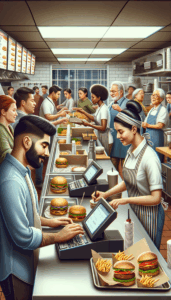Navigating QSR Strategies: From Discounts to Loyalty in 2024
- Phone: +1(833)PHX-Geek
- 712 H St NE Suite 1904 Washington, D.C. 20002
Are you looking to come to Toast POS? Follow this link to sign up and get a free quote from your local Toast Rep. They will come out to your restaurant, and give you a free, no obligation quote.
Introduction
In 2024, Quick Service Restaurants (QSRs) found themselves in a fierce competitive landscape, marked by rising costs and changing consumer behaviors. To attract budget-conscious customers, many QSRs leaned heavily on discount strategies and value menus. This approach was not just a reaction to the economic climate but a calculated effort to maintain foot traffic in establishments battling inflation and increasing operational expenses.
By offering discounts and promotions, QSRs successfully drew in customers looking for affordable meal options. These strategies created a buzz and temporarily increased sales, allowing many restaurants to sustain their operations during challenging financial times. However, while many establishments reported a surge in foot traffic, the reliance on discounts raised concerns about the sustainability of such approaches in the long run.
As the economy began to stabilize and consumer spending increased, it became evident that merely relying on discounted meals was not enough. QSRs needed to adapt to the evolving expectations of their customer base, signaling a shift in focus from short-term gains to long-term loyalty. 
Discount strategies, while effective in the short term, revealed their limitations regarding fostering customer loyalty. Many consumers flocked to QSRs for the deals but were not necessarily inclined to return once the promotions ended. This phenomenon raised critical questions about whether price-driven strategies could lead to customer retention and brand loyalty.
Customers have become more discerning; they seek value beyond mere price cuts. As QSRs offered more value menus, it became clear that these strategies failed to connect with consumers on a deeper emotional level. While customers appreciate a good deal, they also desire experiences that resonate with their values and preferences. QSRs that focus solely on price will struggle to build lasting relationships with their clientele.
The challenge lies in finding a balance between competitive pricing and creating meaningful connections with customers. As the QSR landscape evolves, restaurants must rethink their approach to customer engagement, shifting towards a strategy that emphasizes loyalty through quality, service, and personalized experiences.
As QSR traffic rebounds and consumer spending increases, expectations have shifted notably. Today’s customers are not just looking for a bargain; they demand quality, convenience, and a unique dining experience. The aftermath of the discount-driven strategies calls for a new way of engaging with customers, especially as alternatives abound.
With numerous dining options available, QSRs now face the challenge of differentiating themselves in a crowded market. Customers are seeking brands that align with their lifestyles and values. This shift has forced many QSRs to reevaluate their brand positioning and value propositions, aiming to create authentic connections with their customers.
As QSRs navigate this changing landscape, embracing innovation, transparency, and customer-centric practices will be crucial. By anticipating consumer needs and adapting to their expectations, restaurants can cultivate a loyal customer base that extends beyond price-based incentives.
Conclusion
To ensure long-term success, QSRs must pivot from a discount-centric model to one that emphasizes relationship-building. This requires a comprehensive understanding of customers and their preferences, coupled with strategic initiatives that go beyond pricing. QSRs should explore loyalty programs, personalized marketing, and enhanced customer service to foster deeper connections with their clientele.
Investing in quality ingredients and innovative menu offerings can also enhance the customer experience, encouraging repeat visits for reasons beyond discounts. Collaborating with local suppliers and promoting sustainability can resonate with consumers who value ethical practices.
Ultimately, QSRs must embrace a holistic approach that prioritizes customer engagement and experience to thrive in the competitive landscape of 2024 and beyond. By moving away from discount-dependence and focusing on loyalty-building strategies, QSRs can create lasting relationships with customers that will sustain their success for years to come.